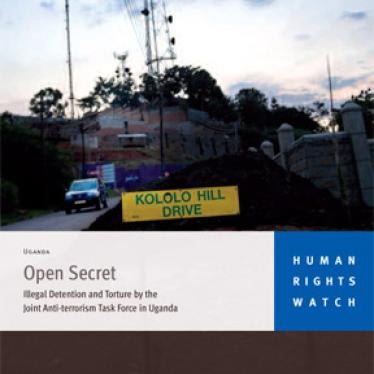In recent weeks, the Ugandan press has been awash with reports about an alleged new rebel group operating in the north. If true, it would certainly be sad. However, the government response to the issue also demands serious reflection.
As the arrest in May of journalist Patrick Otim shows, the government seems set to confront the issue with little regard for the rule of law. It committed procedural violation and raised questions about the veracity of some of the evidence used to justify the arrest of Otim and 10 others in over their alleged involvement with the new group.
Anyone who has planned or conspired to commit a criminal act should be charged, tried, and held accountable. But arrests and trials must meet basic criteria of fundamental fairness and due process. Unfortunately, this is nothing new in Uganda, especially when the military is involved.
Human Rights Watch and other organisations have exposed the problematic role of the military in operations that should be the domain of the police - illegal arrests by unauthorised ad hoc agents and long-term incommunicado detention in un ungazette locations.
In April, Human Rights Watch released a detailed report, ‘Open Secret: Illegal Detention and Torture by the Joint Anti-terrorism Task Force.' The UPDF spokesman, Maj. Felix Kulayigye, responded to that report with an article in the New Vision in which he denied the allegations saying the "the National Resistance Movement/Army's revolution was premised on resisting and stamping out state-inspired violation of human rights using the army, the police and State intelligence organs . . . . It also aimed at restoring democratic governance and the rule of law."
Two weeks later, men in civilian clothes driving an unmarked vehicle, arrested Otim. They did not identify themselves nor inform Otim of the reason for his arrest. His family was not told where he was being taken. When rumours spread that he was being held in a nearby military barracks, the UPDF 4th Division spokesperson denied it. There was considerable fear that Otim was the victim of a "disappearance."
It wasn't until mid-June that the UPDF came clean and admitted that Otim had been in military custody all along, after a habeas corpus petition had been filed. When all 11 detainees finally appeared in court on June 15, it became clear that some of them had been held since September 2008 without charge.
These cases raise many of the same procedural violations of Uganda law that civil society has raised for years. Each time, allegations are met with official denials, such as Maj. Kulayigye's in April. But while officials contend that the UPDF is a defender and not a violator of human rights, time and again, evidence shows that the government flagrantly disregards the country's laws.
Uganda's Constitution provides for many rights and freedoms protected under international human rights law. It requires that anyone arrested be immediately informed of the reason, that they be held in a place authorised by law, that the next of kin be informed as soon as possible, and that they be brought before a court within 48 hours of arrest.
The disregard for these fundamental standards in these recent cases related to the alleged new rebellion raises questions about the motives behind the arrests. If, as was stated when the detainees were finally charged with treason on June 15, that the UPDF has been tracking the activities of the alleged rebel group since 2006, why couldn't they be brought before a magistrate within 48 hours of arrest?
Investigations can continue after such a hearing. If there is evidence against Otim and the others, why "disappear" them for a month or longer? Was the military trying to intimidate them, force confessions, and terrify their families? Long-term incommunicado detention is a serious human rights violation that can lead to other abuses. The UN's human rights body has stated that "prolonged incommunicado detention may facilitate the perpetration of torture and can in itself constitute a form of cruel, inhuman or degrading treatment or even torture."
Otim's case is only one of many. Human Rights Watch has expressed its concerns several times to the Chieftaincy of Military Intelligence (CMI) and the Ministry of Defence about the whereabouts of five people, who, our research suggests, have been held incommunicado by military intelligence in Kololo for several months for alleged involvement with the Allied Democratic Forces. CMI admitted last November that these men were in custody, and then in April made some promises to investigate. But nothing has happened, and their whereabouts remain unknown.
Otim's case demonstrates that the UPDF will lie about its treatment of persons in custody when it is politically expedient to do so. Procedural violations may seem beside the point, given the intensity of the debate surrounding the existence of this alleged rebel group, but in the end, adherence to the rule of law is what separates a rights-respecting government from tyranny.
Ms Burnett is a researcher in the Africa Division of Human Rights Watch.







